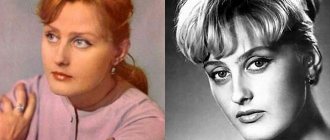Work in the world of cinema
His debut in the world of cinema took place in 2003. This was a minor role in the series “Bayazet”, where Vladimir Volga played officer Alexei Evdokimov. The actor played his first and currently only major role in the film “Thrown March”.
Vladimir appeared in the film as an orphan who decided to join the army, since he had no relatives or close people. His hero served in Chechnya, was captured, and then managed to escape from there. The film was released in 2003 and received 7.0 points out of 10 according to the Kinopoisk rating. This film is one of the most successful works in the filmography of Vladimir Volga.
The actor played his next role in the TV series “Jackpot for Cinderella.” His character is the neighbor of the main character. Among the actor’s works there are a number of minor roles in Russian TV series, the last of which was “Stompers”. Here Volga played the role of Tolik Lyazov, a boxer, thanks to his sports background.
The most interesting
Shameful photos of drunk actresses (10 photos) (01/05/2018)
Famous actresses who should not expose their legs (02/13/2020)
On the Internet it is impossible to find photos in which the artist would be captured with his family, but there are photos where the artist appeared before the public in one or another creative image.
Role in the film “Thrown March”
In 2003, Vladimir Volga became the leading actor in the film “Throw March”. This is a Russian action film directed by Nikolai Stambulov (the actor’s father) about a young guy raised in an orphanage and eager to get into the Chechen war.
The main character Sasha sincerely believes that this is where his destiny is, and at the front he will be able to prove himself. After training, Alexander is assigned to the elite special forces and sent forward to the harsh trials that await him in the war.
However, despite all the difficulties, Sasha remains true to his principles; he heroically shows himself, not betraying his homeland, even after being captured. For him, such concepts as true male friendship, love and nobility are very important in life. Having passed the trials of fate, feeling the pain of losses, the young man finds his love and a home where they will always wait for him and believe that he will definitely return. The film was released under the slogan: “War is a man’s work.”
Creative career of an actor
Wanting to prove to his son that acting is not his profession, the father invites the guy to star in the film “Thrown March”. For the sake of the role, Vladimir even changes his last name, becoming Volga from Istanbulov. The filming once again proved to the young man that he had chosen the right path. When the film was released, Istanbulov Jr. quickly found an army of his fans. But, to the guy’s great regret, this did not in any way affect his subsequent popularity. Several episodic roles and downtime for several years.
Almost all of Vladimir Volga’s roles are in one way or another connected with his physical characteristics. The young actor is invited to play the roles of police officers, security officials, athletes or coaches. Volga agrees to absolutely all proposals so as not to be left without work and not to be just a memory for his beloved viewers.
It is worth noting that the actor still does not lose hope and is waiting until he is offered truly worthy and interesting roles that would be remembered by both himself and the audience. We can say for sure that Vladimir Volga is the owner of a talent that people remember. Therefore, you can be sure that he will definitely find his roles and viewers, becoming one of the most recognizable Russian actors. Vladimir Volga tries not to talk about his personal life, as he believes that this should not concern the public.
Volga-Volga (group) - Wikipedia biography composition
The Volga-Volga project officially began its existence in the winter of 2000. But let’s start, as it should be, from the beginning:...
Everything originated classically - in school closets behind the assembly hall. It was then, in the early 90s, that two bright bands appeared on the Kazan rock scene - “Neutral Zone” and “KuKuKiKiLAI”. The former broke girls' hearts with romantic beats and fiery rock and rolls, the latter promoted the ideas of “AuktYon” and “Sounds of Mu”.
These groups first met on the same stage in February 1993 at some semi-underground session. Maybe it was then that the first stream began to ring? The musicians became fast friends. Alternately, the teams became winners and diploma winners of various rock festivals: “Avtograd” (Togliatti), “Live Wave” (Naberezhnye Chelny), “Fresh Wind” (Ufa), “Teen Star”, “Equinox”, “Injection” (Volga region) and so on.
A lot of joint concerts and decaliters were left behind when a split emerged in both groups - someone decided to go into business, someone began to improve their family life, someone decided to work by profession. And somehow, by itself, the merger of the two collectives took place - for now under the heading “NZ”. A brass section has been added. Stylistically, the course was taken towards Razdolbai folk - with harmonicas, pipes and cool lyrics.
The grassroots laughter culture (not nesting doll splint!) appealed not only to the Kazan public, the musicians were inundated with offers to go on tour - in a record short time, “NZ” toured half of Russia with concerts - Samara, Izhevsk, Kirov, Perm, Ulyanovsk, Saratov, Volgograd, Astrakhan, Nizhny Novgorod, etc. In Moscow, the guys received permanent registration in the clubs “Petrovich”, “Botanik”, “Ogorod”. They immediately heeded the advice to change the name to a more sonorous one. For patriotic reasons (and to make it clearer for stupid people), we settled on the echo of the cinematic heritage.
This is how VIA “Volga-Volga” was born. Many rock authorities highly appreciated the work of the Volzhans - Yuri Shevchuk, Garik Sukachev, Nike Borzov. The song “Fierce” was included in the soundtrack of the film “War” directed by Alexei Balabanov (“Brother”, “Brother-2”). Filming in the series “Truckers-2”, participation in the New Year’s television project “Wider Circle”, tours to Croatia, rotation on “Our Radio”. And, of course, a contract with the legendary Gala Records label for the release of several albums at once, the first of which, “Eggbeard,” has already been released. Garik Sukachev, having listened to the record, immediately proposed a joint performance at the Gorbunov House of Culture, which was a stunning success! At the same time, the Volga-Volga ensemble became interested in video filming and animation, which resulted in several video clips... This is where the fun begins!
Source: https://www.last.fm/ru/music/Via+”Volga-Volga”/+wiki
| Anton Salakaev - vocals, button accordion, songs |
| Sergey Tatarsky - vocals, guitar, songs |
| Artem Shutov - trumpet, backing vocals |
| Sergey Cherepenin - trombone, backing vocals |
| Timur Aibetov - bass guitar |
| Kirill Vasiliev - drums, backing vocals |
| Eduard Nurmeev - sound at concerts, backing vocals |
| Alexander Sukharev - studio sound, percussion |
⭐⭐⭐⭐⭐ Material from Wikipedia - the free encyclopedia.
Colorized version[ | ]
On February 14, 2010, a colorized version of the film “Volga-Volga” was shown on Channel One. The colorization work was carried out in Los Angeles by order of Channel One.[4][11] For colorization, it was the censored version of the 1950s that was chosen, previously published in black and white by the Krupny Plan film-video association on VHS in the Russian Film Classics series and on DVD. This version is listed as the original in the GFF, since the negative itself was edited in the 1950s. In place of the frames with the statue of Stalin in this version there is a black sizing, but with a soundtrack. When creating a color version, these seconds are completely removed.
Biography
Education
- Graduated from the Sevastopol Higher Naval Engineering School (“Nuclear Power Plants”, majoring in mechanical engineering);
- Graduated from the Kyiv Interregional Academy of Personnel Management (“Banking”) in 1999.
He was not a member of the CPSU.
Labor and political activities
- From 1990 to 1993, he was the commander of a turbine group on nuclear submarines of the Northern Fleet of the USSR and then Russia. With the rank of lieutenant.
- From 1993 to 1998 he was a private entrepreneur.
- In 1998, he became the general director of the International Union of Ukrainian Entrepreneurs.
- In 2000, he became the head of the public organization “Public Control” and the leader of the party of the same name.
- In 2004 he ran for the presidency of Ukraine.
- In 2006, he was elected as a people's deputy of the fifth convocation of the Verkhovna Rada of Ukraine on the lists of the Socialist Party of Ukraine.
- In 2008, he became the leader of the political party Union of Left Forces.
- In 2009, he became one of the leaders of the Bloc of left and center-left forces, which included the Communist Party of Ukraine, the Union of Left Forces, the SDPU (o) and the Justice party.
- In 2010, he became the head of the State Commission for Regulation of Financial Services Markets of Ukraine.
Arrest, trial
On July 19, 2011, he was detained by an investigator of the Prosecutor General's Office of Ukraine together with employees of the SBU on suspicion of committing a crime related to corruption.[2] On September 24, 2012, he was sentenced to 5 years in prison.[3] On March 22, 2013, he was transferred from the Kyiv pre-trial detention center to the Poltava correctional colony No. 64, where he worked as a librarian.[4] On December 3, 2014, Vasily Volga was released, replacing the remainder of the sentence with correctional labor[5]. After his release, he survived an assassination attempt.
Theater and cinema
The first time Borisov came to the set was as a student, he played an episode in the comedy “Kum Morgana”. True, they did not consider it necessary to indicate his last name in the credits. In 1974, the handsome actor was enrolled in the staff of the Drama Theater named after. M. Gorky (Kuibyshev, now Samara).
Vladimir Borisov on the stage of the Samara Drama Theater. Source: std-samara.ru
Vladimir Vladimirovich himself thought that he would not stay long in the team and would return to the capital in a couple of years. But, as it turned out, the theater became a second home for the artist, where he still serves.
Bright roles in productions: Trigorin - “The Seagull”, Alyosha - “The Brothers Karamazov”, Berkutov - “Wolves and Sheep”, Smirnin - “Darling”, Prince Volkhovsky - “The Humiliated and Insulted”, Vyshnevsky - “Profitable Place”, etc.
The actor greatly values his starring role as Semyon Savelyev in the film “Eternal Call”. At first, Borisov was very worried and afraid to forget the text. But very little time passed, and Vladimir got into the role so much that he felt like nothing other than Syomka Savelyev (an excerpt from the film can be seen here)
Vladimir Borisov in the film “Eternal Call”, 1978. Source: .kino-teatr.ru
During the same period, he simultaneously took part in the filming of the historical film adaptation of “Emelyan Pugachev” (1978), the role of Vanya Pochitalin. Next, the talented actor created the image of Yuri Vedeneev in the drama “At the End of Summer” and Yaroslav Grozov in the film “On the Taiga Winds.”
The role of security officer Gorbach in the war film “Bread, Gold, Revolver” (1980) was very powerful. Despite the fact that the film was a great success, Savelyev’s role was still much brighter and more significant.
Still from the film “Bread, Gold, Revolver”, 1980. Source: lh3.googleusercontent.com
Next, Vladimir Borisov was cast several times in supporting roles, although he hoped to play something worthwhile and interesting. In 2020, Yuri Kara began filming a biographical drama about the development of astronautics in the USSR, and invited Vladimir Borisov to play one of the leading roles.
On the set of Volga-Volga, Orlova was worried: “Is this really my last young role?”
“Volga-Volga” - a comedy splashing with joy about the battle between the vociferous letter carrier Dunya and the incompetent bureaucrat Byvalov - was filmed during one of the darkest periods in the history of Russia - Stalin’s “Great Terror”. But no traces of fear are visible on the surface of the Volga, which became the favorite painting of Stalin and millions of his contemporaries.
In the early 1930s, the capital began to choke from a lack of water: in the summer, near the Kremlin, the Moscow River could be forded. Therefore, it was decided to launch the grandiose construction of the Moscow-Volga Canal (built, of course, with the help of prisoners). Other topics on the agenda included the Cultural Revolution. Amateur artistic activity suddenly seemed right to everyone (unlike the experiments of Meyerhold in theater and Shostakovich in music). Director Grigory Alexandrov was given a responsible assignment from above: for the 20th anniversary of the October Revolution, to make a comedy film about the people's talents, which in the USSR finally blossomed like daisies in a sun-drenched field.
Alexandrov’s previous film “Circus” did not delight the country’s main moviegoer, Stalin. The director's wife Lyubov Orlova played the American artist Marion Dixon (an allusion to Marlene Dietrich), suffering from the impresario who, however, made her a star. This time Orlova had to play the opposite - the letter carrier Dunya Petrova, a dashing village girl who can sing better than the Americans. Alexandrov decided that Volga-Volga would be a story about a bureaucrat from a provincial town, which is full of nuggets - virtuoso dancers, singers, musicians.
Three people worked on the script: Alexandrov himself, playwright Nikolai Erdman and cameraman Vladimir Nielsen. Erdman has just returned from exile in Siberia. In Alexandrov’s sketch there was no water carrier, no waiters singing the menu out loud, no scandals between Strelka and the composer in love with her, no rivalry between two musical groups sailing to Moscow. There wasn't even Strelka's song. This is all Erdman.
Vladimir Nielsen also went into exile, but it did not harm his brilliant career. By thirty, he became the head of the department of cinematography at VGIK and directed “Jolly Fellows”, “Circus” and “Volga-Volga” for Alexandrov - and considered himself almost a co-director of all these films. The actors all came to him for advice, which irritated Alexandrov incredibly. As did Nielsen’s remark about the wrinkles that began to appear on the face of Alexander’s beloved wife, 35-year-old Lyubov Orlova (“To photograph Lyubov, you need to be a genius,” Vladimir once blurted out.) Orlova herself, Nielsen’s close friend, was also angry: on the set of “Volga...” she asked the operator: “Is this my last young role?”
The role of the bureaucrat Byvalov saved Igor Ilyinsky from arrest - Stalin spared the beloved artist.
This was indeed their last picture together. In the fall of 1937, Nielsen was arrested on charges of espionage. Alexandrov quickly repented to his colleagues and hastily removed the name of the disgraced cameraman from the credits.
“Volga-Volga” was Alexandrov’s first painting, which completely satisfied Stalin: he fell in love with Orlova. One day at a reception, she decided to say a few words, stood up and moved towards the dictator. His guards immediately rushed to block her path. Stalin ordered them to stop and said: “Speak up, Comrade Orlova! Talk as much as you want. We will all stand and listen.” Everyone stood up and listened. According to rumors, at that reception, Stalin even personally tried to perform “Song of the Volga” in a duet with her - this also seems to be true, considering that he had already seen the picture fifteen times.
And the widow of Igor Ilyinsky, who played the main male role in “Volga” - the bureaucrat Byvalov, was sure: it was this film that saved him from the camps (he was being monitored and his arrest was planned). Stalin once approached Ilyinsky at a reception: “Ah, Byvalov! You are a bureaucrat and I am a bureaucrat. We will understand each other!" The leader definitely did not want to send the actor he liked to the camp.
A FEW MORE STORIES
According to legend, Alexandrov, while riding in America on a boat with Charlie Chaplin, began to sing the song “Volga-Volga, dear mother,” and Chaplin blurted out: “You should call the next film Volga-Volga”...
For a long time they could not come up with a name for the heroine, until one day Orlova asked Alexandrov: “Dunya didn’t call?” Dunya was affectionately called Isaac Dunaevsky.
In the credits of “Volga...” Monday is not called Monday, and Tuesday is not called Tuesday: there is “The first day of the six-day period,” “The second day of the six-day period,” and so on. The six-day week was a Stalinist invention: workers rested on the 6th, 12th, 18th, 24th and 30th of each month. The system turned out to be so unviable that it had to be abolished already in 1940.
x HTML code
The best fragments of the film "Volga-Volga".
WE INVITE
To the play “The Master and Margarita”!








